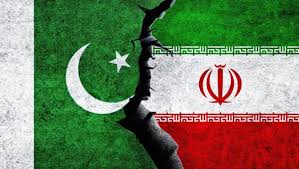
Iranian President’s visit to Islamabad marks milestone in strengthening strategic ties between neighboring countries
Iranian President Masoud Pezeshkian’s recent visit to Pakistan with a high-level delegation marked a turning point in relations between Tehran and Islamabad. The visit goes beyond protocol and has clear geopolitical and economic implications. Experts believe it could usher in a new era of cooperation between the two countries, from trade and energy to security and counter-terrorism.
This was the fifth meeting between the two leaders in the past year. It came just two months after Prime Minister Sharif’s visit to Tehran, where he was received by Iran’s Supreme Leader Ayatollah Ali Khamenei. The leaders’ frequent personal contacts in recent months show their desire to strengthen bilateral ties.
Before leaving Tehran, Pezeshkian stressed that the main goal of the visit was to increase the volume of economic ties between Iran and Pakistan to $10 billion. Given Pakistan’s 250 million populations and the economic potential of both countries, this goal does not seem unrealistic. However, the current economic ties between the countries leave much to be desired. There is a need to reduce tariffs, expand markets on the border, develop tourism and resume the Iran-Pakistan gas pipeline project, the agreement on the construction of which was signed back in 2009.
It was envisaged to build a 2,775 km gas pipeline, 1,172 km of which would run through Iran, and the rest – through Pakistan. The goal was to supply Iranian oil to Pakistan to solve the problem of energy shortages and at the same time earn Iran income from gas exports. However, the project, conceived as a “Peace Pipeline”, has turned into a legal and geopolitical minefield. Iran has completed construction of the pipeline through its territory, investing two billion dollars, but work on the Pakistani section has not yet begun.
With US sanctions on Iran extending to the Iran-Pakistan pipeline project and Washington refusing to allow Pakistan to bypass US restrictions, Iran has taken Pakistan to the International Court of Arbitration over its refusal to build the pipeline. If the arbitration court rules in Iran’s favor, Pakistan will face severe financial hardship. Islamabad will have to pay Iran $18 billion for the delay in the project. It will also continue to suffer energy shortages.
In March 2024, Islamabad tried to persuade the Biden administration to ease sanctions. However, its calls fell on deaf ears. Now, it is preparing to make new calls to the Trump administration, determined to revive the project that was once considered a cornerstone of regional energy cooperation. However, Washington’s ongoing sanctions on Iran’s energy sector have thwarted those plans, cutting off Pakistan’s access to US or any other international financial institution funds to complete the project.
Both sides stressed the importance of convening the 22nd session of the Iran-Pakistan Economic Commission as soon as possible. The issues of expanding barter trade, increasing agricultural exports, developing border markets and removing barriers to trade were discussed. Several memorandums of understanding were signed in various sectors. The leaders of the two countries reaffirmed their common goal of increasing the volume of bilateral trade from three to 10 billion US dollars. Particular attention was paid to the development of border trade. Pezeshkian announced plans to use the Silk Road to establish trade links with China and Pakistan, and then continue to Europe via Iran.
Another important aspect of this trip is Pakistan’s geopolitical position. Sharing a border with Iran, Islamabad has become a strategic partner of China in recent years. Beijing has pledged to invest $60 billion in the China-Pakistan Economic Corridor (CPEC), and major projects are already underway at the port of Gwadar. Iran also has extensive relations with China. In this context, Pakistan, as a geographical link between Tehran and Beijing, can play a key role in advancing trilateral cooperation. In the event of increased sanctions, such a triangle could provide Iran with an alternative path. Tehran has long tried to maintain a balance in its relations with India and Pakistan, which have historically been rivals. But recent events have shown that Islamabad is more supportive of Tehran in difficult situations. During the 12-day Iran-Israel conflict, Pakistan’s representative on the UN Security Council twice supported Iran, while India not only did not follow suit, but also strengthened its arms ties with Israel. This situation has made Islamabad a more reliable partner for Tehran than New Delhi, underscoring the importance of Pezeshkian’s visit. Prime Minister Sharif praised Iran’s clear stance on protecting the Palestinian people and called for an immediate end to Israeli atrocities in the Gaza Strip.
Security and military cooperation are another key topic of the visit. Both countries face common threats along the border, especially in Balochistan. Terrorist groups easily cross the border, posing a challenge for Tehran and Islamabad. Strengthening the intelligence and military partnership can significantly reduce terrorist activity. This is vital not only for Iran’s internal stability but also for Pakistan’s security.
However despite all this, the authorities in Islamabad are not giving up on efforts to normalize relations with Washington as much as possible. The day before the US strikes on Iranian nuclear facilities, Pakistan nominated Trump for the 2026 Nobel Peace Prize for his diplomatic engagement in the conflict with India. A clear sign of the changed atmosphere was the visit to Washington of Field Marshal Munir, virtually the most powerful figure in Pakistan, a few days before the US bombed Iran. Munir was warmly welcomed at the Pentagon by senior officials and was honored with a personal meeting with the US President.
Masoud Pezeshkian’s visit to Pakistan is a significant event that goes beyond mere diplomacy. It symbolizes Iran’s desire to redefine its role in the region and forge closer ties with its eastern neighbor.
Nikolay Bobkin, political scientist, Arbatov Institute for US and Canadian Studies

Location: 103 Kurortniy Prospekt, Sochi, Russia. The Radisson Lazurnaya Hotel
There must be time
Here are the terms of participation
Comments
0